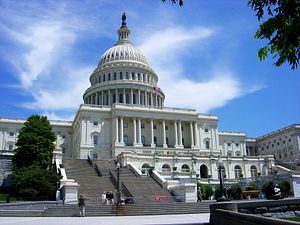A bipartisan group of U.S. senators and congresspeople has called on the United States government to sanction Chinese officials responsible for mass detentions in Xinjiang, China’s far western region. In a letter to Secretary of State Mike Pompeo and Secretary of the Treasury Steven Mnuchin, the commissioners of the Congressional-Executive Commission on China, along with other members of Congress, urged the use of Global Magnitsky Act sanctions “against senior Chinese Government and Communist Party officials who oversee these repressive policies, including XUAR [Xinjiang Uyghur Autonomous Region] Party Secretary Chen Quanguo.”
Human rights activists have been reporting on the mass detentions of Uyghurs, a largely Muslim ethnic group native to Xinjiang, for months. Other Muslim minority groups, including Kazakhs, have also been caught up in the campaign, which Beijing insists is necessary to stamp out the “three evils” of terrorism, separatism, and religious extremism. Most controversially, the crackdown has seen massive numbers of ethnic minorities — estimates range from the hundreds of thousands to over one million – detained in “re-education” or “education and transformation” camps, where they are reportedly forced to pledge allegiance to the Chinese Communist Party (CCP) and denounce their Muslim faith.
Chinese representatives have denied the reports as “unwarranted charges” made by unnamed “anti-China forces.”
The letter to Pompeo and Mnuchin, released by the CECC chairman, Senator Marco Rubio (R-FL), and co-chairman, Representative Chris Smith (R-NJ), expressed concern “about the ongoing human rights crisis” in Xinjiang, “where Muslim ethnic minorities are being subjected to arbitrary detention, torture, egregious restrictions on religious practice and culture, and a digitized surveillance system so pervasive that every aspect of daily life is monitored.” The letter called for the use of Magnitsky sanctions in response. The letter also recommended additional sanctions against Chinese companies “assisting XUAR officials in mass detentions and surveillance of ethnic minorities,” such as video surveillance companies Hikvision and Dahua Technology. All told, the letter was signed by 11 U.S. senators and six representatives (view the letter as a PDF here).
Magnitsky sanctions are designed to target individuals for their participation in human rights abuses. These sanctions have been applied most notably to Russia, the original target of the act as passed in 2012 in response to the death of Russian whistleblower Sergei Leonidovich Magnitsky. After the Global Magnitsky Human Rights Accountability Act was passed in 2016, the law’s scope was expanded to countries around the world. Individuals from over a dozen countries, including Asian countries Pakistan, Uzbekistan, and Myanmar, have been sanctioned under the Global Magnitsky Act. So far, that list has only included one Chinese official: Gao Yan, director of the Beijing Public Security Bureau Chaoyang Branch, where lawyer and human rights activist Cao Shunli died in custody in 2014.
Still, the idea of applying Magnitsky sanctions to China specifically over the mass detention of Muslims is not new. Back in April, Acting Deputy Assistant Secretary of State Laura Stone raised the possibility in remarks to reporters in Beijing. And in June, the Washington Post reported that U.S. Ambassador for International Religious Freedom Sam Brownback was pressing the Trump administration to sanction Chinese officials over a crackdown on religious groups. Chen Quanguo would be Brownback’s “first target,” the Post said. And in July, renowned China legal scholar Jerome Cohen suggested that “the U.S. Government adopt Magnitsky Act sanctions against those responsible for Xinjiang, starting with [Chinese President] Xi Jinping.”
U.S. officials – and particularly Congress – have threatened China with sanctions over human rights abuses for decades, most notably in the aftermath of the 1989 crackdown on protesters in Tiananmen Square. However, since the Clinton administration backtracked on a high-profile pledge to remove China’s “Most Favored Nation” status, successive U.S. administrations have shied away from actually jeopardizing the lucrative trade relationship over human rights concerns.
Given the current mood in Washington, that logic may no longer hold. Between a trade war and the declaration of China as a “strategic competitor” in the U.S. National Security Strategy, the U.S.-China relationship is fraying on various fronts. Under those circumstances, long-held differences over human rights could make a comeback as a pillar of U.S. policy.
































